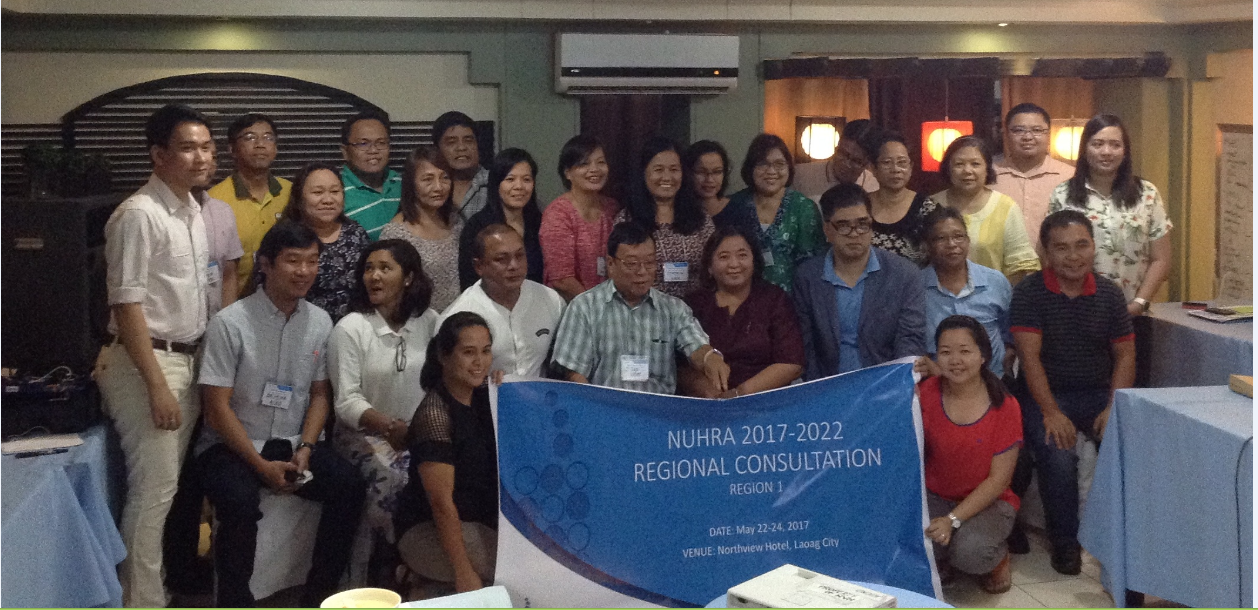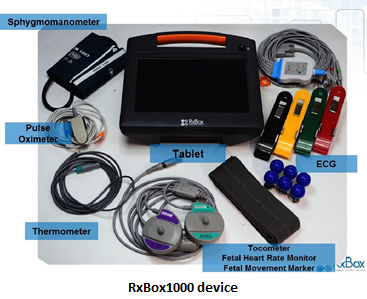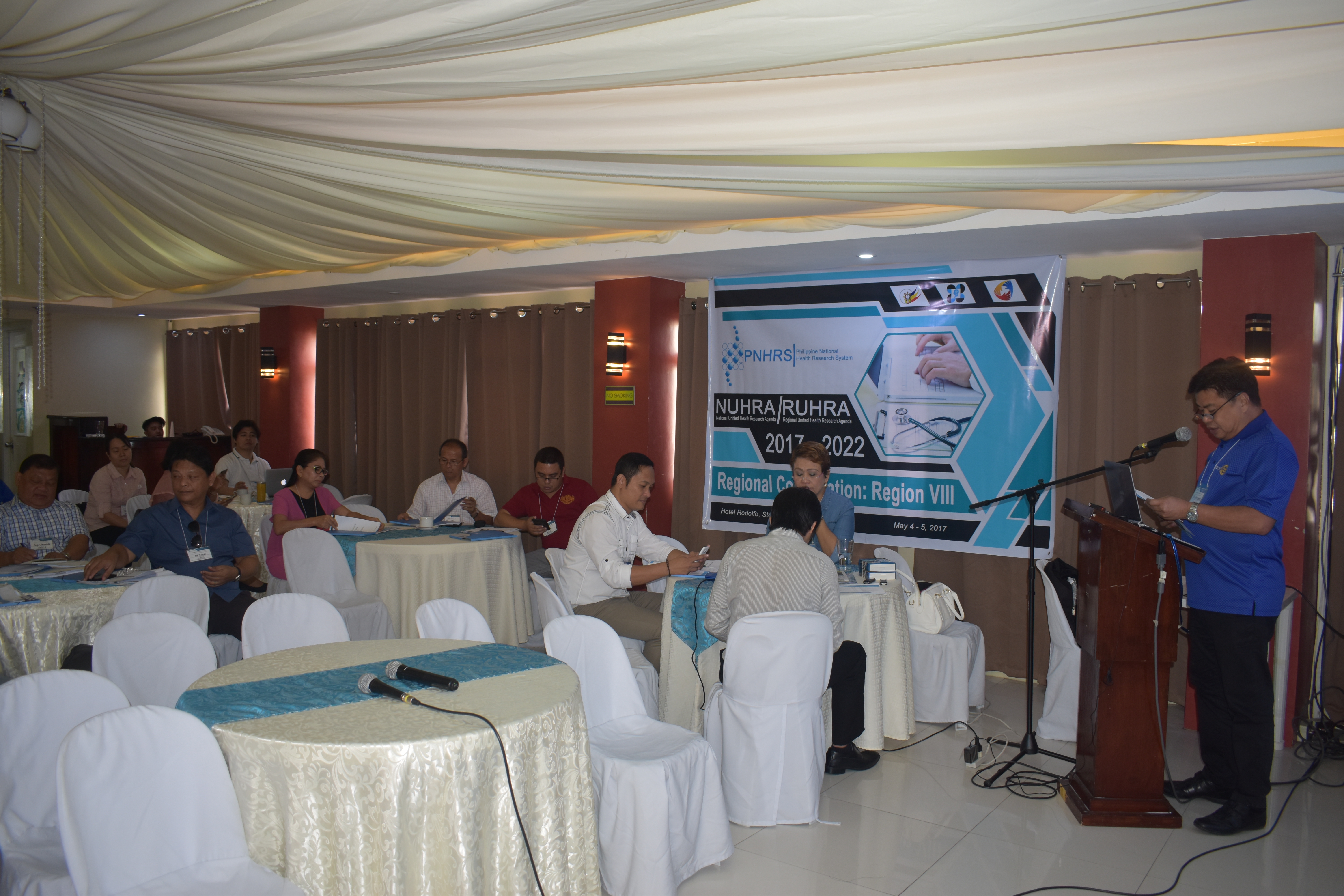
As part of the methodology for developing the National Unified Health Research Agenda (NUHRA), the Department of Science and Technology-Philippine Council for Health Research and Development (DOST-PCHRD), through its partner organizations,conducted a two day regional consultation in region 1 entitled "Organizing Consultative Workshop Towards the Development of the Philippine National Health Research System's Regional Unified Health Research Agenda (RUHRA) 2017-2022.The consultation was held on May 23-24, 2017 at the Northview Hotel, Brgy. Nalbo Laoag City,Ilocos Norte facilitated by the Healthdev Institute.
This consultation was part of the larger effort in developing the NUHRA 2017-2022, which specifies the areas for health research that need to be studied.The regional consultation served as the venue for all relevant stakeholders to create the Regional Unified Research Agenda (RUHRA) priorities.
Participants who attended the said consultation were member and non-member institutions of the Region 1 Health Research and Development Consortium (R1HRDC) to wit: National Commission of Indigenous People (NCIP), Pangasinan Medical Society (PMS), Panpacific University North Philippines (PUNP), Northern Christian College (NCC),Northwestern University (NWU),Mariano Marcos State University (MMSU), Lyceum Northwestern University (LNU),Region 1 Medical Center (R1MC), Virgen Milagrosa University Foundation Inc.(VMUF), Ilocos Training and Regional Medical Center (ITRMC),Commission on Higher Education (CHED),Department of Science and Technology (DOST), Department of Health (DOH),Philippine Information Agency (PIA),Don Mariano Marcos Memorial State University (DMMMSU),National Economic Development Authority (NEDA), University of Northern Philippines (UNP) and Mariano Marcos Memorial Hospital and Medical Center (MMMH&MC).
Speakers during the regional consultation were Dr. Miguel Antonio Salazar and Mr. Teddy S. Dizon bothe from the Alliance for Improving Health Outcomes (AIHO) Inc. and Mr. Paul Ernest De Leon from PCHRD-Research and Development Management Division. On the 1st day, topics discussed were: Introduction to the PNHRS and the NUHRA,Orientation to the NUHRA and RUHRA agenda setting priorities,Inputs:Technical Papers and Regional Situationer,Brainstorming session and plenary.On the 2nd day,topics were: Setting Criteria for Prioritization,Prioritization Exercise,RUHRA 2017-2022:Results of Prioritization,Planning for RUHRA dissemination,funding monitoring and Evaluation of the Regional Consultation.
After thorough review and deliberation of the group,there were eight (8) priority areas created for region 1 under the RUHRA and these were the following: (1) Triple Burden Disease (2) Health of the Vulnerable Populations (3)Drug Discovery and Development (4) Health Technology and Development (5)Food Safety and Nutrition (6) Health Governance and Policies (7) Functional Foods and Nutraceuticals and (8) Health Financing.
The consultation became a good venue for interaction and improved the relations between and among the participants.
Tacloban City, May 25, 2017 - The United Nations Educational, Scientific and Cultural Organization (UNESCO), in collaboration with some academic institutions namely, the Philippine Normal University, Leyte Normal University and Southern Leyte State University, is now set to spearhead a research project for the education and health improvement of the indigenous peoples in Southern Leyte for year 2017.
During the preliminary meeting conducted by the four parties at SLSU, it has been discussed that the project, which was given the working title “Collaborative Research on Indigenous Peoples”, specifically targets the Mamanua tribe inhabiting the municipalities of San Juan and St. Bernard in Southern Leyte, while some members of the tribe also live in the highlands of the municipality of Hinunangan.
The research program is under the Education Sustainable Development (ESD) arm of UNESCO, of which aim is to provide a literacy scheme that targets a college education for the Mamanua. This will cover funding and other educational mechanisms for the tribe.
Meanwhile, prior to UNESCO collaboration, the Southern Leyte State University-San Juan (SLSU) and the Korean Food for the Hungry International (KFHI) from Korea have their partnership for more than six years, particularly on Child Development Program (CDP).
The partnership started in January 17, 2011 as reflected on the Memorandum of Agreement signed by the Municipal Mayor of St.Bernard and the Campus Administrator of SLSU-San Juan.
The project is entitled Academic Enhancement Activity for CDP wherein the beneficiaries are the 8 barangays of the municipality of St.Bernard and one barangay from the municipality of San Juan.
The said activity is participated in by 256 recipients from kindergarten to high school.
It is noted that last year, the CDP beneficiaries increased from 256 to 429,to include eight (8) university scholars. The program’s main objective is to enhance students’ academic performance. It likewise includes medical and dental mission and summer bible school, bringing transformative education for societal transformation.
Health - and all issues that accompany it - is viewed quite differently from the provincial perspective. To combat a persistent cough, a person from the big city would most likely reach for a pharmacy grade Guaifenesin; a person from the far provinces however, would instead opt for a herbal preparation proven effective through generations of use.
Following this idea, one may begin to identify the many aspects that affect the chemical vs concoction decision-making process in the primary health care, such as accessibility, availability, affordability and acceptability of the cure.
Those aspects however just barely scratch the surface. Should a cheaper variant of the pharmacy cure be developed for the provinces or should a pharmacy drug be developed based on the provincial herbal mixtures? The rise of these questions merits the conduct of research for the development of solutions applicable for both the city and the provincial scene.
Recently, agencies behind the development of the Regional Unified Health Research Agenda (RUHRA) began their provincial consultations to identify the health issues, needs, and concerns of provinces in region IX for 2017 to 2022.
On April 25, local health units in Zamboanga Sibugay gathered to discuss the province's practices with the Departmen of Health (DOH-IX), the Zamboanga Consortium for Health Research and Development (ZCHRD) and the Department of Science and Technology IX (DOST-IX).
The involved agencies focused on Identifying issues and concerns in health systems like governance, financing, workforce, the use of Information Communication Technology (ICT), vulnerabilities and high-risk groups, and the overall health status of the province.
These consultations are scheduled to carry on through Zamboanga City (April 27-28), Zamboanga del Sur (May 2-3), Zamboanga del Norte (May 9-10), and culminate with a regional consultation (May 15-16), which will amalgamate all issues and concerns from the different provinces.
These issues and concerns will be translated into researchable areas / topics, which are then to be combined the RUHRA from other regions around the country, and will be brought up to the national level for a consolidated National Unified Health Research Agenda (NUHRA). (Bon Padayhag, DOST IX Press Release)

Tacloban City, May 17, 2017 - The RxBox1000 is the continuation of the successful nationwide implementation of the RxBox100 project from the previous years. The current project aims to deploy 1000 RxBox devices nationwide in which 88 is allotted for the Eastern Visayas region. The Department of Science and Technology Regional Office VIII spearheaded by the Regional Director and Project Leader Dir. Edgardo Esperancilla, CESO II, is the implementer of the project in the region in partnership with UP Manila National Telehealth Center and Department of Health Regional Office VIII. The national coordinator is the Department of Science and Technology Regional Office IVA.
The project aims to deploy RxBox devices and implement the use of an Electronic Medical Record (EMR) such as Community Health Information Tracking System (CHITS) and Integrated Clinic Information System (iClinicSys) with telemedicine to provide better access to life-saving health care services in isolated and disadvantaged communities nationwide.
The RxBox is a telemedicine device capable of capturing medical signals through a built-in medical sensors, storing data in an electronic medical record and transmitting health information via internet to a clinical specialist in the Philippine General Hospital or Eastern Visayas Regional Medical Center (EVRMC) for expert advice. The device is composed of five (5) medical sensors that includes a Tocometer/Fetal Heart Rate Monitor, Electrocardiogram (ECG), Blood Pressure Monitor, Pulse Oximeter, and a Temperature sensor. It is a medical device that can be used for diagnostic procedures as well as an Electronic Medical Record (EMR) which can be utilized for the storage and referral of clients’ medical records. The presence of these technologies in the community will hopefully reduce child mortality (MDG 4), improve maternal health (MDG 5), and detect non-communicable diseases which consequently lead to better health for all Filipinos.
RxBox1000 project implementation has commenced in the region and based on the assessment conducted by the Department of Science and Technology Regional Office 8 and the corresponding provincial offices, the following is the breakdown on the number of municipalities that were identified to be recipients of RxBox1000 in the region: Leyte-37, Biliran -3, Southern Leyte-10, Samar-8, Eastern Samar-17, and Northern Samar-13. The RxBox will be deployed to the respective Rural Health Unit (RHU) of the municipalities identified. Currently, pre-deployment activities of the project is initiated in the region which includes site validation, site data gathering and Local Government Unit (province and municipality) coordination/orientation and the deployment is to follow after the orientation and trainings if stakeholders in the RHU. The message of using technology to advanced quality healthcare in the country is shared in these activities.

Tacloban City, May 4, 2017 - Now on-going is the conduct of Regional Consultation on National Unified Health Research Agenda/ Regional Unified Health Research Agenda (NUHRA/RURHA) for CY 2017-2022 at Hotel Rodolfo, Tacloban City from May 4 to 5, 2017.
The activity is being spearheaded by the DOST Philippine Council for Health Research & Development (DOST-PCHRD) in cooperation with the Eastern Visayas Health Research & Development Consortium (EVHRDC). The PCHRD commissioned the Alliance for Improving Health Outcomes (AIHO) for the development of NUHRA and RUHRA 2017-2022.
Present in the activity are the different personalities of stakeholders involved, particularly Ms. Annie Catameo, Regional Program Officer of PCHRD, Engr. Edgardo M. Esperancilla, Regional Director, DOST8 & EVHRDC Co-Chair, Engr. Ernesto M. Granada, EVHRDC Director, Dr. Paula Paz M. Sydiongco, ARD, DOHRO8 and Mr. Leonido P. Olobia, Regional Research Program Coordinator, DOHRO8 & EVHRDC-RMC Chair.
Engr. Esperancilla gave his Opening Remarks highlighting EVHRDC’s stronger efforts to develop priority proposals for funding. Dr. Minerva P. Molon, the Regional Director of DOHRO8, and Chair, EVHRDC will provide her message before the end of the afternoon session.
Ms. Pearl Tumlos of the Research Management Division of PCHRD provided a brief introduction of the PNHRS as well as the introduction of the Research Agenda Committee (RAC) of the PNHRS which spearheaded the development of the NUHRA for 2017-2022.
Dr. Miguel Dorotan, Project Manager for the NUHRA Development discussed in detail the process of RUHRA/NUHRA Development. As mentioned, the 2-day activity which will involve workshops and plenary sessions will be a priority listing of the researchable topics in health for the next 6 years (2017-2022). The RUHRA document will serve as a live document for the region which will take into consideration relevant and emerging topics for health research.
CALLING FOR ENTRIES!!!
The Eastern Visayas Research and Development Consortium (EVHRDC), in its commitment to promote and empower health research activities in Region 8, will be conducting 2017 Regional Health Research Symposium to be held on June 13-14, 2017 in Tacloban City. This year, the symposium is anchored on the them "Eastern Visayas Health Research and Innovations: Empowering and Transforming Communities". Among the highlights of the activity is the region-wide contest for Oral Research Paper Presentations (Professional Category), Poster Exhibits (Professional and Undergraduate Category) and Poster Making contest.
Electronic copies of papers are expected to be submitted on or before May 5, 2017 at This email address is being protected from spambots. You need JavaScript enabled to view it. for the preliminary evaluation and judging. See attached photo for the qualification and format.
Tacloban City, April 21, 2017 -- The Eastern Visayas Health Research Development Consortium (EVHRDC) in coordination with the Department of Health (DOH) Region 8, has conducted for its third year, the Basic Research Methods Training last April 18 to 21, 2017. This was held at the Ambassador Hotel in Tacloban City.
The training was participated in by member institutions with submitted capsule research proposals and other possible research topics. Dr. Ophelia Mendoza of University of the Philippines, College of Public Health, and consultant for Philippine Council for Health Research and Development Consortium (PCHRDC) was the resource speaker of the activity.
In a statement given by Mr. Leonido Olobia, Research Program Manager for DOH 8 and chair of the executive committee of EVHRDC, he said that the purpose of the basic research methods training is to enhance the research knowledge and skills of potential research proponents who would eventually submit capsule research proposals for possible funding of the consortium.
Almost half of the training participants have already submitted capsule proposals, hence, the training would likewise help them improve their efforts in accordance to PCHRDC format.
Last year, there were about 18 health proposals submitted, of which nine were approved and funded. These are all products of the second basic research methodology training.
For this year, it is expected that the training would help make more approved health research proposals in the region, based on the Regional Unified Health Research Agenda (RUHRA).
The five-year RUHRA (2017 – 2021) is currently being updated for the region and organizers of the training has a list of potential titles submitted to consortium member institutions for possible health research proposals.
During the training, the participants were asked to formulate health proposals based on the priority programs on public health, particularly communicable and non-communicable diseases, maternal and child health, family planning, local health system particularly referral system and Inter Local Health Zone, HFEP, RLED, health promotion campaign, food and drug administrations, and priority clinical health researches for hospitals in the region such as the Eastern Visayas Regional Medical Center (EVRMC).
The health proposals that were presented during this year’s basic research methods training were likewise focused on research topics pertaining to evaluation on the implementation of dengue control policies and ordinances, food insecurity among families, nutritional status of children, effects of wound healing properties from blue crabs, occupational and home health hazards, non – communicable health diseases practices, fish preservative practices, eating preference of school children, and evaluation of health programs.
According to Dr. Mendoza, this year’s training is unique from the previous basic research training methodology because of the variety of health research proposals that focused on evaluation of policies and ordinances, case studies, communicable and non-communicable diseases, cross sectional studies and also qualitative researches. These proposals will be evaluated for funding by the executive committee of EVHRDC.
Participants for the training include Cherryl Adulante and Josie Rose Pilapil of Samar State University (SSU), Rona Alcera and Sarah Delorino of University of Eastern Philippines (UEP), Maria Dulce Alibangbang and Fermina Gensonof Visayas State University(VSU) – Tolosa , Garry Adriano of Department of Education, Elmer Ayuson of LPH – PHO, Jason Baldesco, Alena Gonzaga, and Lilibeth Miralles of Visayas State University (VSU) – Alang-alang, Monna Liza Bosqueand Annabelle Hufalarof Southern Leyte State Universtiy (SLSU).
Other trainees were identified as Miraluna Caturan of College of Maasin, Fideliza Cojuangco, of Eastern Visayas State University (EVSU) Ladie Ann Conde of PhilRootcrops – VSU, Annievel Del Pilar of NCC Region 8, Kathrina Destura of Divine Word Hospital, Ray Dominic Ladera of Eastern Samar State University (ESSU), Clive Ivan Mercado of St. Scholastica College of Tacloban, Inish Chris Mesias of DFST – VSU, Rolando Quilantang Sanitary Inspector of Ormoc City, Shiela Tante Epidemiologist from Alang-alang Leyte, and Gracia Verona of University of the Philippines, Tacloban.
The four-day training was facilitated by DOH and EVHRDC officials and personnel headed by Mr. Leonido Olobia, Program Manager for Research of DOH and Executive Committee Chair of EVHRDC, Dr. Lucia Dauz, EVHRDC Coordinator, Dr. Ernesto Granada, Assistant Director of DOST, Region 8, and staff and Secretariats Ms. Joy Sunneth Bacalla, Ms. Mary Joyce Hebrio and Mr. Jeffrey Hinampas.



